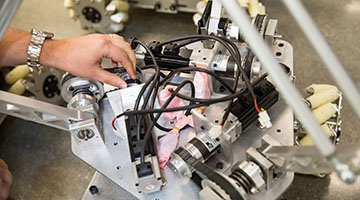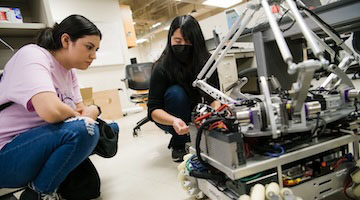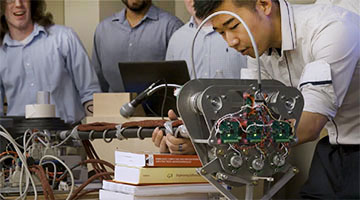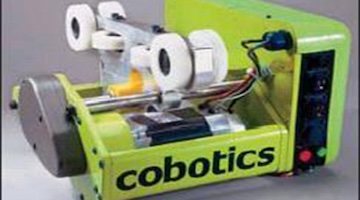
Research
Our research encompasses four general themes:
Innovating at the confluence of robotic and biological systems
The Center for Robotics and Biosystems is working toward a future where humans and robots collaborate seamlessly to achieve what is currently impossible; where sensors, actuators, and controllers are inspired by biological principles; and where robotics and computational modeling lead to breakthroughs in our understanding of human and animal neuromechanics. Because our future will benefit from the synergistic co-evolution of humans and robots, the center’s research focuses on the science and engineering of embodied AI.
This research is highly interdisciplinary. Accordingly, the center consists of faculty and students from several departments who share ideas, facilities, and research space. Faculty in the center have appointments in mechanical engineering, biomedical engineering, computer science, the medical school, and the Shirley Ryan AbilityLab (the former Rehabilitation Institute of Chicago). The common research space promotes the cross-pollination of ideas.
The CRB advances the science and engineering of embodied AI by providing shared facilities for education and research, serving as a catalyst for interdisciplinary collaborations, and being home to major research initiatives.
The Center for Robotics and Biosystems is part of the McCormick School of Engineering.
From the classroom to the lab to the marketplace, the Center for Robotics and Biosystems is ushering in a new era in robotics.

Our research encompasses four general themes:

In addition to many academic departments at Northwestern, the center brings together resources, space, labs, facilities, and people from numerous groups and institutions both internal and external to the University.


Cross-pollination of ideas
Explore our home that includes specialized laboratories; a high-ceilinged atrium for flying drones; a makerspace; and a wide-open collaboration space that the researchers call the “robot zoo.”
"We envision a future where humans and robots work together seamlessly. We are working on robots to augment human abilities, not replace them."
-- Kevin Lynch, Director of the Center for Robotics and Biosystems